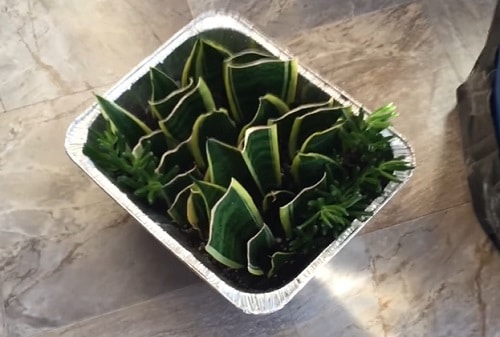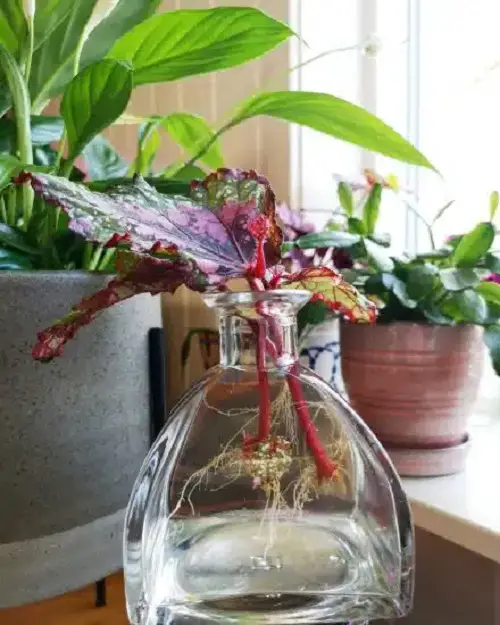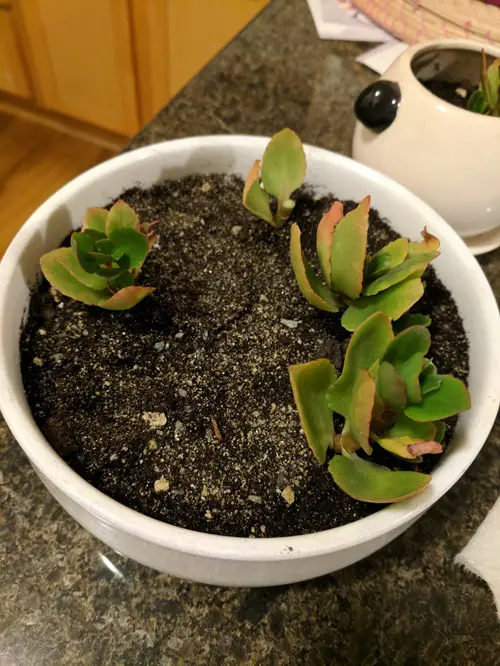Planning to propagate plants in late fall, don’t miss our list of Houseplants that Grow from Cuttings in November. Not just that, learn some helpful tricks too!
Mid and late fall is not an ideal time for propagation unless you are in a frost-free region with a warm, arid, or tropical climate (USDA Zones 9 to 11); for such a climate, this is an ideal time to grow succulents and houseplants cuttings.
Despite all that, you can still propagate houseplants from cuttings if you live in a cold climate–just follow our list and expert tips suggested below.
Houseplants You Can Grow from Cuttings in November
1. Pothos
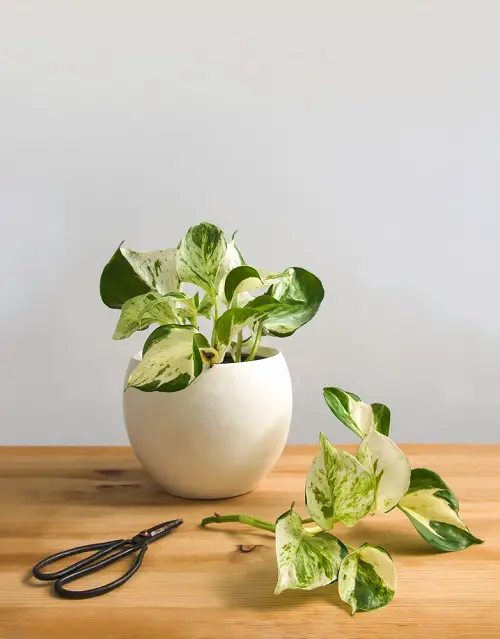
Botanical Name: Epipremnum aureum
Pothos is probably the most popular indoor plant because it is low maintenance; it is also one of the easiest houseplants to propagate. Snip a healthy 5-6 inches long stem from the vine, remove any lower leaves near the cut end, and transfer it in soil or water until it develops roots. You can read the propagation details here.
2. Spider Plant
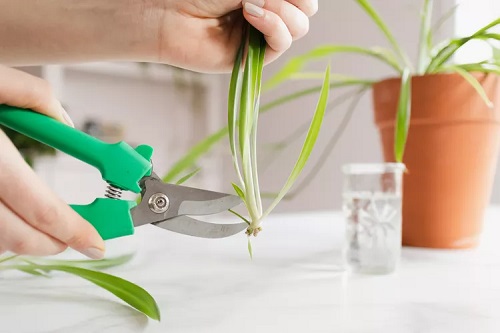
Botanical Name: Chlorophytum comosum
Spider plants produce “spiderettes,” or baby plants on long arching stems. Cut off one of these baby plants along with a bit of the stem and place it in water or soil to root. You can learn how to get your spider plant to produce more spiderettes here.
You can find how to propagate spider plants here
3. Snake Plant
Botanical Name: Sansevieria
Snake plants can be propagated by offsets, dividing the rhizomes, or by leaf cuttings. In November, leaf cuttings can be placed in the soil to grow new plants, and till the spring, they become ready for planting; learn more about the process here. You can read more ways in detail to propagate snake plants here.
4. African Violet
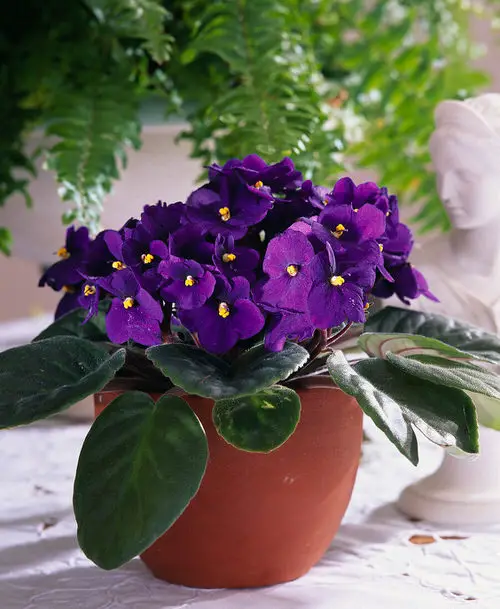
Botanical Name: Saintpaulia
African violets are another great houseplant that can be propagated from leaf cuttings. Select a healthy leaf, cut it into sections, and place them in a pre-moist potting mix. Learn about growing African violets from leaves here.
How to Force African Violets to Bloom Better and Fuller
5. Jade Plant
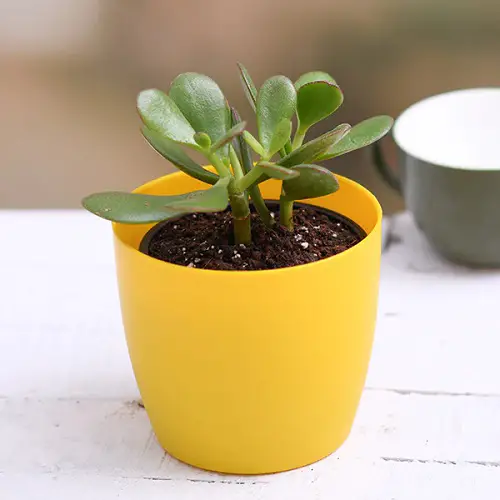
Botanical Name: Crassula ovata
Jade plants are probably the easiest houseplants that can be propagated from stem or leaf cuttings in November, especially in frost-free climates (USDA Zone 9 to 11); this is the best time. Allow the cut ends to callus for a couple of days, then position them in well-draining soil. You can find all the details here.
Check this post and learn about Jade plant care indoors
6. Rex Begonia
Botanical Name: Begonia rex-cultorum
Rex Begonias are admired for their stunning and unique foliage. You can propagate this plant from just the leaf cuttings 😃 or stem cuttings and place the cut end either in the soil following the traditional method or grow it in a beautiful vase of water. Whatever you do, don’t forget to read our informative article on growing rex begonias from cuttings here.
7. Flowering Kalanchoe
Botanical Name: Kalanchoe blossfeldiana
Kalanchoes are known for their vibrant, long-lasting blooms and resilience, making them a gorgeous addition to your indoor collection. They can be grown from stem cuttings, it’s super easy to do this successfully by allowing them to callus for a couple of days and plant them in a well-draining succulent mix.
Learn how to grow flowering kalanchoe indoors in this post
8 Tricks for Successful Propagation in November
1. Create a Microclimate
Create microclimates within your home by placing cuttings in warmer spots, like on top of the refrigerator or shelf or near heating vents or radiator (just near, not too close). You can also keep your propagating plants with a group of houseplants. These small temperature variations can make a difference in rooting success.
2. Enclosed Propagation
Consider using a small terrarium, glass cloche, big plastic bottle, or even a small greenhouse to propagate cuttings. These enclosed environments can maintain higher humidity levels and provide a controlled space for propagation.
3. Use Bottom Heat
Invest in bottom heat tubes designed for propagation. These heated mats or tubes can be placed under the propagation tray to provide consistent bottom warmth to stimulate root growth and seed propagation.
4. Apply a Fungicide
Use ground cinnamon as a natural fungicide. Dust a small amount of cinnamon on the cut end of the stem before planting it, then dust again after a week. Cinnamon has antifungal properties that can help prevent rot. You can also apply a commercial fungicide similarly.
Read cinnamon dust benefits for plants here
5. Use Seaweed as a Rooting Hormone
Diluted seaweed extract can be used as a rooting hormone alternative, just like honey. Soak the cut end of the stem in a combination of water and a small amount of seaweed extract before planting.
6. Clove Oil Pest Control
Clove essential oil diluted in water can be used as a natural pest control method. Spray it on the cuttings and surrounding areas to deter pests without harming the plants.
Read about essential oils for gardening and how to use them
7. DIY a Greenhouse
If you’re serious about winter propagation, consider investing in a small greenhouse cabinet designed for indoor use. These cabinets provide controlled environments with adjustable temperature and humidity settings.
8. Growing in Water
Some plants can be propagated in water as nicely as soil. In fact, it is more fun, we even created a list of our favorite indoor plants that grow best in water; check that out here.


